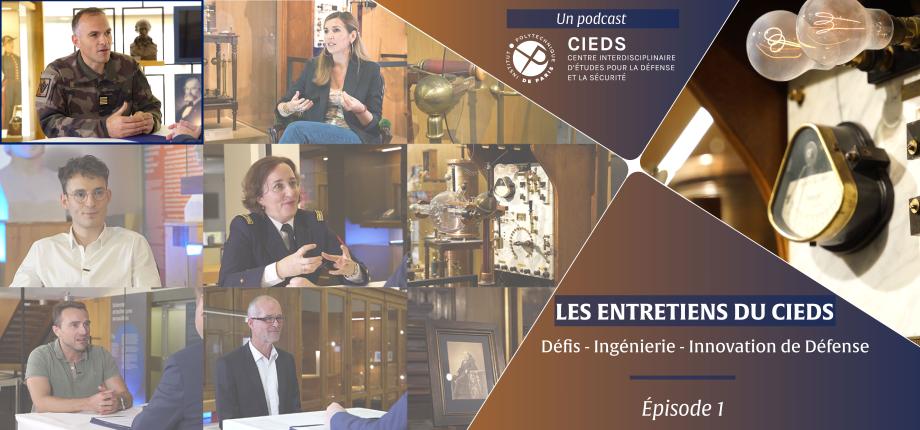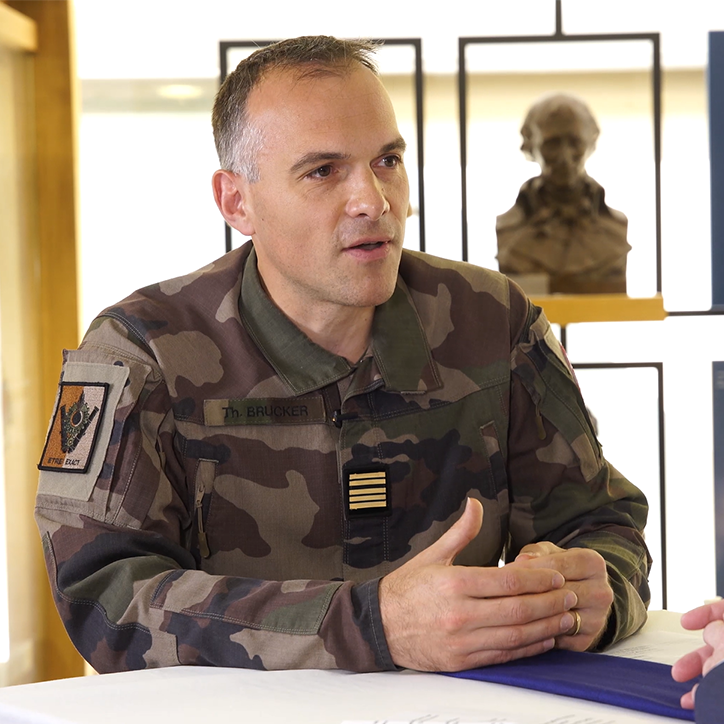Les entretiens du CIEDS : in episode 1, meet Colonel Thomas Brucker of the French Army

About the speaker

Colonel Thomas Brucker
Director of Battle Lab Terre
Section Land Forces
"Like all my operational comrades, we are faced with situations of uncertainty, even chaotic situations, where innovation, whether in our procedures or in technology, can provide solutions".
A graduate of the Saint-Cyr military academy, the École de Guerre and the Arts et Métiers engineering school, Colonel Thomas Brucker is an army officer with an impressive CV and a particularly operational background. He commanded the Paris fire brigade unit protecting the Guiana Space Centre. He has also served on NATO's International Staff and has expertise in the nuclear, radiological, biological and chemical (NRBC) field. He has been deployed to Mali as part of United Nations missions, and was Chief of Staff of the second fire and rescue group within the Paris fire brigade. He is currently Director of Battle-Lab Terre.
Key moments in the episode
Battle-Lab Terre is a structure dedicated to short-loop open innovation for the French Army. Its mission is to detect civilian innovations that could find applications in the military field, and more specifically benefit army soldiers.
What progress report can Battle-Lab Terre make at this stage?
According to its Director, the structure has passed the Valley of Death and is currently in a consolidation phase. Unfortunately, this is not the case for some innovation structures which, after the initial hype, find themselves forced to close down just three years after their launch, explains Colonel Thomas Brucker.
What projects have been set up between CIEDS and Battle-Lab Terre?
The speaker points out that the collaboration between CIEDS and the Battle-Lab Terre (and more broadly the French Army) is part of a network approach. In particular, projects have been initiated by the structure in collaboration with the solid mechanics laboratory (LMS) at the École polytechnique.
How can we understand the relationship between the civilian and military sectors?
According to Colonel Thomas Brucker, it is interesting to encourage dialogue and the sharing of ideas between these two worlds, but also to open our doors to showcase use cases developed in collaboration with the Defence Innovation Agency. He also points out that innovation is often driven by the civilian sector.
What are the Battle-Lab Terre's defence innovation priorities?
The guest explained that in terms of research, the Battle-Lab Terre is focusing on a low-cost, low-tech approach. From a methodological point of view, the challenges facing the Battle-Lab Terre are to develop organisation and agility so that we have the right devices at the right time to be able to innovate according to the situation.
What expectations does Colonel Thomas Brucker have of the younger generation when it comes to defence and security issues?
Colonel Thomas Brucker advises the younger generation to be curious about this changing world. He believes that tomorrow's engineers have a crucial role to play.
What have been the main thrusts of the innovation process in the French Army over the last few years?
Today's speaker explains that, in recent years, a two-stage reorganisation has taken place within the equipment section, backed up by the creation of the Battle-Lab Terre: the co-location of players under a single command and, more recently, the transformation of the army with the creation of a new command, the Future Combat Command.
How do you reconcile the fast, agile world of innovation with the long, robust world of the army?
According to Colonel Thomas Brucker, this is a real challenge. On the scale of Battle-Lab Terre, and with the benefit of two years' experience, he stresses the importance of supporting innovation from the outset, right from the testing phase.
The CIEDS would like to thank Colonel Thomas Brucker for his fascinating interview and for the time he has given to this brand new project to raise awareness of defence issues.
The CIEDS would also like to thank the Section technique de l'armée de Terre.













